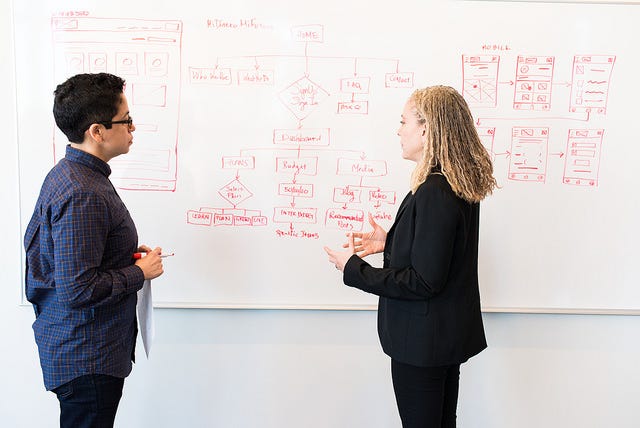Reading-Notes-for-Advanced-Software-Development-in-Python-Course
Whiteboard Interview

A whiteboard interview is your chance to demonstrate your technical knowledge when presented with a coding problem. Whiteboard interviews are common at many levels, so even if you’re applying for your very first job as a frontend developer, you might need to demonstrate your coding chops live.
Typically, interviewers will ask you to work out a solution on the spot by writing your code on a whiteboard while the interviewing team observes and peppers you with questions. The problem may take up to an hour to solve, and the entire interview may last a day.
Why do companies conduct whiteboard interviews?
The great question to ask yourself when faced with a whiteboard is: Why am I doing this? What does this exercise show the company that isn’t already on my resume? It turns out it’s less about your ability to get the right answer, and it’s ALL about your problem-solving skills. That’s why people like Ries don’t mind revealing the problem beforehand: Knowing what you have to solve doesn’t necessarily give you an advantage.
What are hiring managers looking for?
When you’re on the job, you’re not going to operate in isolation. Hiring managers want to know how you think on the spot, how you collaborate with colleagues, and how you troubleshoot when you hit a roadblock. If there’s a bug in your code or it doesn’t pass quality-assurance testing, how do you make changes?
Don’t worry too much, but interviewers aren’t just looking at what you write on the board. They’ll assess whether you ask for feedback during the process or prefer to keep it all in your head until the end. Your reaction under pressure is also a key part of these interviews, according to tech consultant Scott Hanselman. If you feel challenged, then don’t take it personally. It’s better to respond by showing your thoughtfulness and collaboration skills.
Tips
-
HAVE A LIST OF PRACTICE QUESTIONS Although it’s difficult to predict what questions you will be asked the day of your interview, compiling a list of potential whiteboard questions is essential to helping you practice and gain confidence, as you would do for the non-technical portions of your interview. Make sure to list out different kinds of problems, because your interviewers will want to test your ability to solve on the spot. Variation is key.
-
SIMULATE THE ACTUAL EXPERIENCE There’s no better way to get a feel for what the whiteboard interview would be like than having a mock interview with someone who has done it before. If you don’t know someone who is readily available, Codementor has thousands of expert developers who can help you prepare and practice for your interview. You can even schedule a mock interview with experienced technical interviewers and hiring managers to evaluate your strengths and weaknesses so you can properly prepare for the real thing.
-
ASK QUESTIONS Once you are are given a question, take a deep breath and a moment—but not too long—to assess the problem before you begin. If something is not clear or you feel like you need additional information before you can continue, be sure to ask your interviewer for clarification with a few follow-up questions to eliminate any ambiguity.
-
EXPLAIN YOUR THOUGHT PROCESS After the details of the task are clear, be sure to talk out loud as you solve the question. The interviewer wants to know what is going on in your head and understand your approach to the task at hand, so being able to explain your thoughts is crucial. For this portion of your interview, often times, you will be judged on your thought process, regardless of whether you’re able to provide a solid answer.
Keep in mind that even if you are unable to solve the problem, you want to be able to show that you’ve taken the logical steps to attempt to do so.
-
BE CONFIDENT Sometimes, during your whiteboard interview, it may be difficult to think of an answer when you’re on the spot, but keeping your cool and staying confident in your abilities will always leave a good impression. You’ve put in the time and effort to prepare yourself for your whiteboard interview, so trust your instincts and go with your gut.
Even if you feel like you may not have provided the best answer, make sure to stay positive, engage with the interviewers, and persevere to the end of the interview. You won’t be judged only on the whiteboard portion of your interview, so even if you had a small hiccup, don’t worry about it.
Keep in mind that being on the right track will always be better than giving up halfway. Think of this portion of your technical interview as a way for the company to evaluate how you would handle difficult situations, so be yourself and trust me, you’ll get through it!